P-MAP Clears Obstacles and Cheers Alumni, Expanding Physician Pipeline
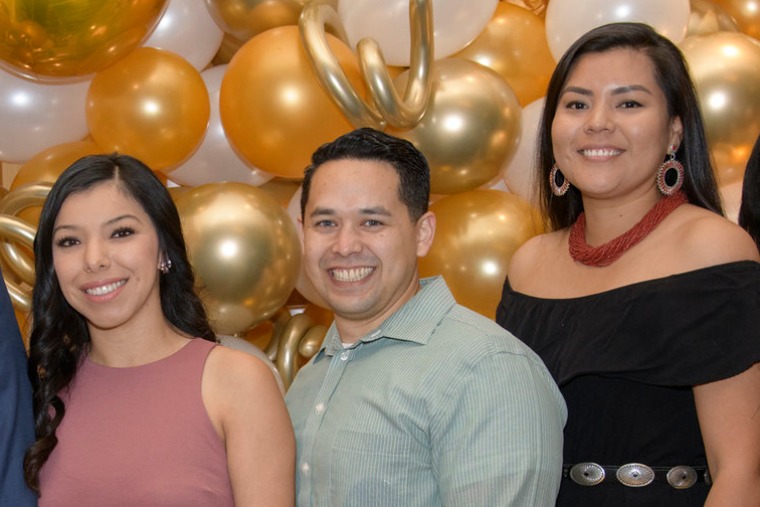
Marisela Mariscal, MD, Jeremey Gneck, MD, and Lacy Manuelito, MD, members of the first P-MAP cohort
The University of Arizona College of Medicine – Tucson will honor exceptional alumni who have completed the Pre-Medical Admissions Pathway (P-MAP), an intensive medical school preparation program that every year accepts 10 promising students who have faced considerable obstacles on their paths to medical school. Students who successfully complete the program are guaranteed admission to the medical college.
“I really needed that steppingstone from undergrad to medical school. Had I gone straight into med school, I don’t know that I would have been prepared,” said Marisela Mariscal, MD, a member of P-MAP’s inaugural cohort. Five members of this cohort, including Dr. Mariscal, are completing their residency training programs next month and will enter their professions as P-MAP’s first full-fledged physicians. A sixth member of this cohort is in a four-year residency program that will finish next year.
P-MAP was launched in 2014 and is open to Arizona residents, particularly underrepresented students such as those from rural, tribal or border communities; speakers of Spanish, Navajo or other indigenous languages; and first-generation college students. The program offers participants mentorship, academic and professional development skills, research opportunities and hands-on clinical experience — and provides the opportunity for tight-knit friendships among members of each cohort. So far, 63 P-MAP students have entered the medical college.
The ceremony will honor those completing three separate milestones: P-MAP alumni who are completing residency training programs; P-MAP students who are graduating from the UArizona College of Medicine – Tucson with medical degrees; and current P-MAP students who are completing the program and preparing to enter medical school in July.
Expanding care to underserved communities
By targeting students from populations underrepresented in the medical field, P-MAP supports the creation of a more diverse and culturally competent health care workforce.
Dr. Mariscal, who is of Laguna Pueblo descent, completed rotations at the San Xavier Indian Health Service center and several rural hospitals, and is interested in continuing to work with Native and other underserved populations. Through her residency in family medicine, she has worked with patients who are uninsured, patients in the criminal justice system, patients experiencing psychiatric crises and patients facing substance abuse problems.
“I’ve grown a passion for underserved populations and am learning ways to help them,” Dr. Mariscal said. “I’m thankful my residency has allowed that.”
Throughout her childhood on the Navajo Nation, Lacy Manuelito, MD, received her health care exclusively through IHS. She continued to serve this population as a student and pediatrics resident rotating through several IHS clinics, including the Fort Defiance Pediatric Clinic in her hometown as well as other locations in Phoenix and Southern Arizona.
“When I was younger, they didn’t have many Native physicians working in the hospital,” said Dr. Manuelito, also a member of P-MAP’s first cohort. Informed by her experience, she knows first-hand what many of her patients’ families might be facing and can tailor her advice accordingly. “A lot of reservations have high rates of poverty and are often food deserts. Eating five servings of fresh fruits and vegetables isn’t feasible for some of these families. We need to figure out alternatives to help these families have a healthy diet.”
Maintaining connections
Many P-MAP alumni hope to stay in Arizona and serve marginalized and rural communities, where the need for primary care physicians is greatest.
“Arizona has always been my home. My family is from the Pascua Yaqui tribe, right here in Tucson,” said Jeremey Gneck, MD, another member of P-MAP’s inaugural cohort. “I want to continue with the advocacy and research that I have done.”
P-MAP alumni say their connections with one another have been invaluable in their success. At next week’s event, Cohort 9, which is slated to begin P-MAP this month, will be guests in the audience, with the opportunity to network with those who went before them. It will be another chance for students to form bonds as they encourage and support one another.“This isn’t something that I’ve accomplished on my own. Numerous people behind the scenes have cheered me on and supported me,” Dr. Gneck said. “It was nice to have that built-in cheerleader, someone who can push you. You need that support system to get you to your ultimate goal.”
Meet Members of the First P-MAP Cohort
Mohamed Abdelhabib, MD: ‘I love being with people’
When Mohamed Abdelhabib, MD, was a middle school student in Sudan, his love of science was awakened by an enthusiastic chemistry teacher. He brought this fascination across an ocean when his family moved to Tempe, Arizona.
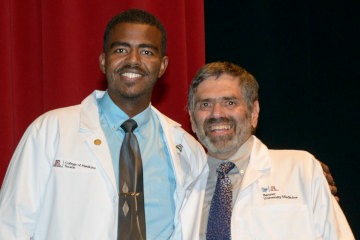
“Science made sense — it clicked with me. I didn’t know what to do with it, though,” he recalled. “In high school, an anatomy class would inspire me to take a career path in medicine. That, plus my dad was ill.”
When Dr. Abdelhabib was a junior in high school, his father received a devastating diagnosis, and he observed first-hand the marks medicine can make on an entire family structure.
“My dad got diagnosed with a brain tumor,” he recalled. “The whole treatment, all that I had to go through with him, really got me interested in the field.”
After graduating with a bachelor’s degree in genetics from Arizona State University, he prepared to apply for medical school, but struggled with the entrance exam.
“Science is my strength, but the test is different. I didn’t know how to study for it,” he recalled. When an email landed in his inbox announcing the P-MAP program, he paid attention. “P-MAP would help with the MCAT, plus they offered a master’s degree. I could shoot for Plan A, but if things don’t work out, I could rely on the master’s degree. I always like to have a Plan B.”
The graduate courses were excellent preparation for medical school, and his cohort received hands-on clinical experience learning how to perform physical exams.
“We got a little taste of what to expect in medical school,” Dr. Abdelhabib said. “It’s a big jump going from undergrad to medical school, and P-MAP made the transition a lot smoother.”
In medical school, Dr. Abdelhabib kept an open mind as he explored specialties.
“Pathology piqued my interest because I love science. Then I did cellular and molecular medicine. But one thing steered me away — I love being with people,” he recalled. “I went into internal medicine because I love people and trying to help those who have less access to health care.”
He is completing his internal medicine residency at Banner University Medical Center in Phoenix through the UArizona College of Medicine – Phoenix. In the future, he plans to practice in Arizona but maintain a connection to Sudan, where, as a medical student, he spent nearly a month on a clinical rotation in Al-Ubayyid, the town where he was born.
“One of the reasons I went back there was to hone my clinical skills, like the physical exam. That’s what they mostly rely on there, because they don’t have the imaging and fancy things we have here,” he said.
Through the Sudanese American Medical Association, which organizes service trips to Sudan, he hopes to help the Sudanese people.
“I have family back in Sudan. I want to go back and serve,” he said. “I want to do things that have a long-lasting impact, so I’ll be focusing on preventive health measures. How can we get clean water to the hospital? How can we screen people for hypertension early, before they develop kidney disease or heart disease? My big goal is to translate what I know into actions.”
Jeremey Gneck, MD: ‘That human connection’
Arizona native Jeremey Gneck, MD’s road to medicine wasn’t a straight path. As an undergraduate in genetics and biotechnology at Brigham Young University, Dr. Gneck volunteered as an interpreter in a local hospital. Hoping to keep his Spanish skills sharp, he came away from the experience with a strengthened interest in medicine.
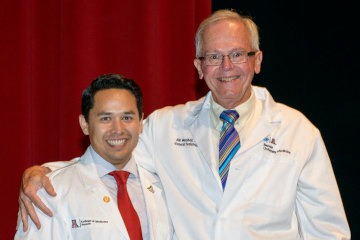
“I met people from different backgrounds, spoke their language, and helped them with health issues, like substance abuse,” he recalled. “There was that human connection, being able to meet them in their need and help them through these difficult challenges.”
During this time, Dr. Gneck made an especially poignant — and heart-wrenching — human connection on a day that began like any other, when he walked into a room with a doctor and expecting parents. With no prior knowledge of the diagnosis, he found himself translating devastating news of a fetal demise, and he watched as the parents began to weep at his words. The situation was tragic, but Dr. Gneck admired the doctor’s compassionate delivery.
“They were very emotional — and he was kind, sensitive and sincere,” he said. “He displayed to me the type of physician I wanted to become.”
After completing his bachelor’s degree, Dr. Gneck prepared to apply to medical school, and was accepted into P-MAP, where he found an instant community.
“It helps to have that soundboard to talk it out with other people going through the same process, who have a similar background,” he said.
Once he started his rotations in medical school, Dr. Gneck’s path took a few more twists and turns as he narrowed in on his calling. He initially had his eye on the operating room.
“I loved general surgery,” he said. “My dad and I did a lot of work with our hands. I was taught young how to cut and lay tile, how to weld, so I really liked that application of surgery. I got the satisfaction of fixing a problem and there being an end to it. But I didn’t have that human connection.”
He soon realized pediatrics was a better fit.
“Adults will have chronic diseases for years or decades by the time they seek care from a surgeon,” he said. “With pediatrics, there’s opportunity to meet individuals before some of these lifelong habits or chronic illnesses set in.”
He began the pediatric residency program at the College of Medicine – Tucson through Banner University Medical Center. When his pediatric training took him into the emergency department, his eyes were opened to further possibilities.
“Emergency medicine is a hybrid of the two things I like. I get some of the surgical aspects, and meeting people in moments of crisis. And I get some of the general medicine, like diabetes or asthma,” he said. “Now I think I’d like to do peds with emergency medicine. That’s been a twist.”
Another twist came during the pandemic, when he was “redeployed” to serve older adults, who were hit hardest by COVID-19.
“I did some adult emergency medicine, and that changed my perspective again. I’m fascinated by seeing all ages, from birth to death,” he said.
Throughout his journey, Dr. Gneck has remembered his experience as a medical interpreter working with the devastated parents and caring doctor.
“The physician was very empathetic to their need in that particular moment. He demonstrated that some of the greatest care comes through the personal interactions with patients and their family members,” he recalled. “I’ve tried to employ that, acknowledging my own limitations as a person, and do the best I can for whoever I’m encountering.”
Lacy Manuelito, MD, MAS: ‘I loved my time here’
When she was a child receiving medical care at an Indian Health Service clinic in Fort Defiance, Arizona, Lacy Manuelito, MD, MAS, knew she wanted to be a doctor.
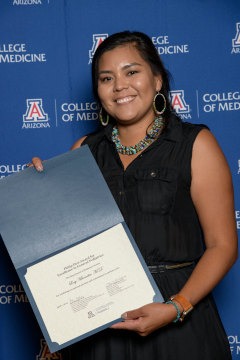
“My mom was diligent about scheduling appointments ahead of time with the same pediatrician, so I was able to create a really close relationship with her,” she recalled. “Dr. Elizabeth Leister was a white woman who decided her family was going to live in Fort Defiance. She raised her kids there, had faith in our community and school system, and was an amazing pediatrician. She’s the reason I went into pediatrics.”
A member of the Salt River Pima-Maricopa Indian Community, Dr. Manuelito spent her childhood on the Navajo Nation, where her mother was employed. After completing degrees at Arizona State University and the University of New Mexico, Dr. Manuelito was preparing to apply to medical school, and vividly remembers the day she learned about P-MAP.
“I was supposed to be studying for my anatomy and physiology test, and I was taking a break. The University of Arizona was a top choice for medical school, so I was exploring the website and saw the P-MAP program,” she said. “I read the description and was like, ‘This sounds perfect.’ The application was due later that week, so I was struggling to submit my application that Friday. Luckily, things came together.”
Her move to Tucson was just as frenzied as the P-MAP application process.
“I finished my finals in Albuquerque on Thursday, had to pack up my house on Friday and Saturday, and then drive to Tucson to have my first orientation on Sunday evening,” Dr. Manuelito recalled.
She says P-MAP equipped her with the tools she needed to succeed in medical school.
“The courses we took gave me a foundation to build on in med school,” she said. “I couldn’t imagine doing med school without P-MAP.”
After receiving her medical degree, Dr. Manuelito began her residency training in pediatrics through the College of Medicine – Tucson at Banner University Medical Center. It was her top choice.
“During my third-year clerkship, you could feel how much of a family the pediatric residents were. During my fourth year, when they remembered my name, I was like, ‘Whoa, you actually know me,’” she recalled. “When I was looking at residency programs, I was comparing everything to Tucson. ‘What does this program have that Tucson isn’t able to offer me?’ There just weren’t enough things to outweigh Tucson. I was very happy to stay here and I loved my time here.”
Dr. Manuelito’s journey through medical school brought her back to Dr. Leister — not as a patient, but as a student and mentee. By that time, Dr. Leister had moved south to work at the Phoenix Indian Medical Center, and during medical school and as a resident, Dr. Manuelito worked side by side with her former pediatrician to learn the craft.
“I did all of my med school shadowing with her in the clinic and talked to her about my career,” she recalled. “In January I went back as a resident to work in the clinic with her again.”
Dr. Manuelito’s face lights up when she talks about pediatrics.
“When I am able to see that fresh newborn whose mom has no idea what she’s doing, that’s my favorite type of visit — being able to reassure the moms and help them with whatever issues they’re having,” she said. “I love it!”
Marisela Mariscal, MD: ‘I’m going to keep learning forever’
Tucson native Marisela Mariscal, MD, always had her sights set high and was prepared to work hard to reach her goals.
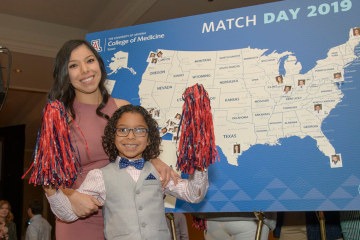
“As a child, I wanted to be the first woman president of the United States,” she recalls. “Then I wanted to be a lawyer.”
In middle school, her interests turned from the law to science, and by high school her focus had narrowed to medicine. Her connection to the University of Arizona College of Medicine – Tucson began the summer between her freshman and sophomore year, when she attended an intensive enrichment program now called Med-Start, which immerses underrepresented Arizona high school students in hands-on explorations of health professions.
“I learned a lot, and I got to shadow a pharmacist and a physician. That opened the door for volunteer opportunities at Banner, on the medical floors and in the pharmacy,” Dr. Mariscal said. “I appreciated the interaction with patients that a physician had, more so than a pharmacist, and became interested in medicine.”
Her path set, she enrolled at the University of Arizona, graduating from the College of Medicine – Tucson with a bachelor’s degree in physiology and medical sciences. By this time, she was a young mom of a toddler, working in her family’s restaurant while studying for the medical school admission test. She learned about P-MAP shortly before its application deadline, and quickly applied.
“I had just had my son, and I had my family in Tucson to help me with him,” she said. “I was really thankful to be able to stay in Tucson.”
Dr. Mariscal is now completing her residency in family medicine through the University of Arizona College of Medicine – Tucson at Banner University Medical Center – South Campus. Her residency program had a rural track, which brought her to clinics all over Southern Arizona.
“I saw how medicine is done in areas like Willcox and Safford,” she said. “Those doctors have to be resourceful in dealing with limitations.”
Her experience as a resident in rural areas helped build her confidence and independence — fast.
“In a rural setting, you’re the only resident there. You get a lot of autonomy because they really need you,” she said. “The first time I was in Willcox, the doctor said, ‘I’m going to work in my office. When you’re done seeing the patient, let me know.’ I’m like, ‘What the heck? I’m only an intern!’ The fact that he trusted me was really helpful in building confidence.”
Dr. Mariscal is excited about the lifelong learning a career in medicine entails.
“Medicine is constantly changing and becoming better, and new research is always being done,” she said. “I’m going to keep learning forever.”
For now, she is most looking forward to completing residency — and enjoying some downtime.
“It’s been so many years of studying and hard work. All the self-doubt and challenges have paid off, and I’m very excited to be around the corner from being finished,” she said. “I’m looking forward to having some control back in my life and hanging out more with my kid. He was 3 when I started P-MAP and turned 11 this year. We’ve been through it all together!”
WHAT: The P-MAP graduation ceremony
WHEN: Wednesday, May 11, from 11 a.m. to 2 p.m.
WHERE: The Health Sciences Innovation Building Forum (1670 E. Drachman St., Tucson).
The ceremony will feature speeches from several UArizona College of Medicine – Tucson leaders, including Michael M.I. Abecassis, MD, MBA, dean of the College of Medicine – Tucson, and Victoria Murrain, DO, vice dean of diversity, equity and inclusion, and a ceremony in which Carlos Gonzales, MD, FAAFP, assistant dean of curricular affairs and member of the Pascua Yaqui Tribe, drapes Angela Monetathchi of the Comanche Nation with a blanket to welcome her into the medical community as she prepares to begin medical school in July. Refreshments will be served.
Contact Mona Lopez at mllopez@arizona.edu with questions or to RSVP.
Anna C. Christensen

